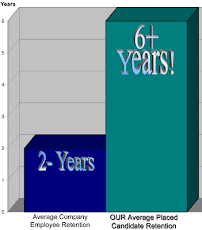Though we wisely worry about rising unemployment during this recession of 2008, there is another, quite different problem that soon will confront the nation: a shortage of workers.
The challenge will not be too few jobs, but too few people to hold them.
Americans of childbearing age simply are not producing enough kids to meet the economy's future need for workers, notably in fast-growing fields such as medicine and engineering. The shortfall is coming largely because the fabled baby boom generation was so huge—75 million Americans born in the 18 years from 1946 to 1964—that no other generation can be expected to match it any time soon.
Now the baby boomers are aging—they range from 44 to 62 years old—and their overall numbers in the labor force are shrinking.
They are being replaced by two younger generations, each with its own desires regarding the opportunities and rewards available at work. The challenge for hiring managers is to figure out what these workers' needs are, so that employers will be able to find them, hire them, and keep them on the job.
The different generations are being intensely studied by W. Stanton Smith, a human relations specialist and a principal of Deloitte LLP, the consulting firm. In his recent book, "Decoding Generational Differences," Smith identifies three generations, and what each wants from employers.
The baby boomers: They place a heavy emphasis on work and successfully climbing the corporate ladder. Work is an anchor in their lives.
The Gen Xers, born between 1965 and 1980: They enjoy work but are more concerned about the work-life balance.
Generation Y, also known as Millennials, born after 1980 and now age 28 or younger: They often have different priorities than their Gen X and baby boomer counterparts, Smith says.
"Because of their reliance on technology, [Millennials] think they can work at any time and any place and believe they should be evaluated on the basis of work produced—not on how, when or where they got it done. Curiously, most Millennials want long-term relationships with employers, but on their own terms," Smith says.
"The real change in their work-force attitudes is a decrease in ambition in favor of more family/personal time and less pressure in life generally speaking," he says.
Also, the Millennials have been raised to question authority and demand value for money. They came of age in a world of layoffs and corporate scandals, fostering the belief that businesses in general, and big businesses in particular, value their own financial gain above all else, and that business talk about the importance of people is largely insincere.
The Millennials respond poorly to those who act in an authoritarian manner and those who expect to be respected due to higher rank alone. They believe they can learn quickly, take on significant responsibility and make major contributions far sooner than baby boomers think they can.
In the next decade, according to Smith, the American professional work force will continue to age and shrink. The median age of the overall population and the labor force will increase as the majority of the baby boomers move into their 50s and 60s, and the oldest into their 70s. From now until 2015, workers aged 55 to 64 will be the fastest-growing segment of the labor force.
Between 2003 and 2008, an estimated 24 million baby boomers will have left the active workforce, primarily from executive, administrative, and managerial jobs.
Gen X presents a much smaller pool of available workers, and will not be able to fill the positions left vacant by retirements. The pool of available workers among those aged 25 to 44 will have decreased by 7% from the level of 2003, resulting in a significant labor shortage.
"In fact," says Smith, "every year for the next 30 years, there will be fewer young people to replace retiring workers. The labor shortages will continue well into the future, as average annual growth of the work force is projected to hover at around 1% through 2015."
By MARSHALL LOEB
MarketWatch














No comments:
Post a Comment